Writers Kit Whitfield and Charlotte Bond have taken an October artist prompt challenge and turned it into dark fiction fodder. Here, they share what’s going on.

Both of us came on this challenge more or less by chance: a friend messaged Kit suggesting the hashtag #2024MakeAMonster, and Kit decided to do something silly, and then delightfully Charlotte decided she wanted to play too. The hashtag itself is pretty simple: a one-word prompt for every day of October, encouraging artists to post a daily drawing up until Halloween.
‘Artists’, you’ll note. Visual artists. But neither of us draw, so we decided to do what we can, which is write. Our goal, circumstances allowing, is to write a short horror story every day for 31 days in a row. No, we haven’t got the sense we were born with.
But we are learning some interesting things from it – and being different writers, sometimes we’re taking different lessons. What have we discovered behind the veil?Â
What was it that attracted you to this challenge in the first place?
Kit: For me it was an impulse decision that caught me at a peculiar time. I’d just finished a novel and sent it off to my agent, and was waiting for her to finish reading it and get back to me. That’s always a bit of a limbo space if you don’t have a new project lined up – and having a new project ready to start is, unfortunately, not the way I work. Wish it was, but I get fully absorbed in one project at a time and have difficulty picturing ever writing anything else ever again; time between books, for me, is like time between life-rafts.
So I think I started doing it as a way of taking the pressure off. My next goal, obviously, is to start a new novel project, but I’m someone who does that by experimentation. I figured that one way to get myself limbered up would be to write a lot of small things – not least because the pressure was low: if you’ve only got a day to write them, that’s a pretty good excuse for the quality being variable at best. It’s a good counter to paralysing perfectionism, which is something that can hit hard when you’ve just finished a whole book. I reckoned I’d at least be able to show myself that I am actually capable of making things up, which is a lesson I have to learn and re-learn no matter how many books I write! It was a way of keeping my brain active in an awkward period.
Charlotte: I find writing prompts incredibly helpful with my development as a writer. A prompt will often send me off in a direction I never would have thought of on my own. So when I see a list of prompts, I’m spurred to respond.
I write horror and dark fantasy, with a particular love for Christmas horror stories, so October to January is prime inspiration time for me. I think if I’d seen the Make a Monster challenge at any other time of the year, I might not have attempted it. But my brain goes into overdrive in October with Halloween round the corner!
In addition, my social media output is not as great as I’d like it to be, so posting a story a day felt like a great way to increase what I was putting out to the world.
How do you make it work with your writing process?
Kit: You know, the other day I was at a book event and a question from the floor was, ‘Are you a planner or a pantser?’ – that is, do you plan your plots before writing or do you fly by the seat of your pants? And I could only describe myself as a ‘helpless pantser’. I am, I’m coming to accept about myself, a full-blown improviser. I can’t pitch an unwritten novel: last time I tried, I ended up having to write the whole thing to figure out where it was going, and it ended up with the intended villain being a hero and half the plot belonging to a character I hadn’t even thought of. If you want to know what my story will be, ask me after I’ve written it.
One analogy that I’ve come to during this challenge: for me, planning my stories is like trying to take a fish for a walk. It sounds like you might get somewhere, but in the end I just stand there watching something die. So for me a daily prompt is more like being chucked in the water and being told to start swimming. It’s kind of daunting, but you get the brain you get.
Actually I’ve got positively superstitious about it! I post the full image every time I share on social media, but I’m trying really, really hard not to see any of the prompts except the one I’m just sitting down to. It’s like avoiding spoilers: I’m much more confident of my ability to write a story if I don’t know what it’ll be about until I get started, and the ones where I did see them in advance are, I think, not my best.

One consequence is that the stories I’m doing vary enormously in length – so far they’ve ranged from 400 words to 4,000! But a great deal of what keeps me writing is the freedom to be playful and say, ‘F*ck it’ – so, well, f*ck it.Â
Charlotte: I’m a huge planner. Huge. But I also have a point at which I go: You know what? I’m just going to see what the characters do. So I kind of mix and match when it comes to planning and pantsing. I’ll write and stick to my plan, and overall I keep my plan in mind, but sometimes my characters take me on unexpected paths.
I did start off trying to plan my stories in advance, putting the prompts in a little notebook and writing ideas down when they came along. Unlike Kit, I find that not looking at the prompt before I sit down and write the story leads me to freeze. I can’t think of anything. But if I jot a note or two down in advance, let “the boys in the basement†(as Stephen King would say) have a bit of time to dig up some ideas, that works best.
However, the notebook went out the window by week two because I found that I was just coming up with stories on the spot. It was almost like my brain just got into the habit of thinking up stories and was maybe quietly working on them in the background. I still couldn’t sit down and write the story immediately: I needed an hour or two in advance to consider the idea, let it mull over, see where it went. But I was finding I didn’t need to think about it the day before.
In addition, one of the main things I wanted to experiment with in relation to this challenge was whether I could actually write a whole short story in under one thousand words or so – because posting on Facebook can be pretty restrictive in terms of word count; no room for your 7,000-word story here! So for me, it was a challenge not just to try and think up a new story each day, but for that story to be short and sweet and complete. I think I mostly achieved that, and it’s given me a good boost.
What’s the main thing you’ve learned so far?
Kit: I think for me it’s clarified what gets me writing. You know that old question, ‘Where do you get your ideas?’ It’s one that writers hate having to answer because it’s weirdly difficult, but you can usefully rephrase it as, ‘What gets your brain moving in a good direction?’

And I think what may have attracted me to this particular challenge is that, being intended for artists, the prompts were all extremely concrete. A lot of horror anthologies are arranged by theme, like ‘the uncanny’ or ‘religious terrors’, and that’s perfectly reasonable: it gives a lot of flexibility to people submitting, allows for many different approaches, and collates along lines that readers can guess at a glance will or won’t interest them. But I simply don’t do well with abstract prompts because, in my brain, theme is something I discover by writing or that I identify after I already have a first draft. For me, using theme as a prompt means trying to write a story backwards, and it never goes anywhere.Â
(Photo by Annie Spratt on Unsplash)
Tell me to write something spooky involving the word ‘garden’ or ‘toothy’, though, and I have something tangible for my brain to play with. I start building around it, finding ways to create a story – which sometimes ends up playing around in spaces that might make you guess I started with a different prompt if you didn’t know what I did start with, but that’s fine.
So I guess the thing I’m finding out in action is: I’m a writer who needs prompts, and they need to be tangible. Some people always have a lot of ideas lined up in their brains, and frankly I envy them, but I don’t work that way and I do better when I don’t try. The comforting side of that is discovering that the starting point can be a single word that wasn’t even supposed to provoke a story in the first place!
Charlotte: I’ve learned that I’m better than I thought I was at writing short fiction! However, even as I’ve been going along, I’ve had the stories I’ve written percolating in the back of my mind, with ideas for how I could extend and improve them.Â
I already knew that writing prompts helped me, but one of the things I struggle with is variety in my writing. I am one of those people who has lots of ideas lined up in their brain (sorry, Kit!) but I sometimes find that they can verge on being too similar. This has made me think about variety in my writing. Did I write a friendly monster yesterday? Then today I need an unpleasant one. Did I use first person or third person point of view? Was my protagonist male or female (or monster)?Â
I’m also terrible at self-rejecting stories, especially longer ones like novels. I get about two thirds of the way through and think it’s rubbish and no one should ever see it. But the thing about being committed to posting one thing a day is you kind of have to post your story whatever you think of it. I found that quite scary but then also kind of rewarding. Now that I’m partway through, I look at my output and the fact that I’m pretty happy with most of them, and I feel better about my writing.
Do you worry about burnout or getting exhausted with the pace?Â
Kit: Oh yes. But then when I’m not writing I worry about never being able to write again – and I mean, if I wrote this morning then I’m worrying about that by this afternoon, so I can’t blame the challenge for that! That’s another lesson: if you have impostor syndrome there is nothing you can do to appease it. You just have to learn to live with it as a goblin on your shoulder: it ain’t gonna shut up, but you don’t have to listen to it either. It’ll find a way to tell you your writing’s doomed no matter what you’re up to, and in the end it’s all just blah, blah, blah, because what does the goblin know? It never wrote anything!
But more seriously – yes, sometimes I do feel tired, especially because this involves weekends as well, and since I knew I was going to FantasyCon and would be too busy to write I had to do three extra stories in advance. You do that, you have to expect to be tired. I just try to get enough sleep as well.
(An additional fact has been that I got sick during the week I’m writing this. Shorter stories have been the result! I should probably rest more, as Charlotte says below. My self-care skills are . . . not the best.)
The other risk, in terms of burnout, is that the structure of a short story is easier to see at a glance, so sometimes my shoulder-goblin accuses me of being repetitive; I just have to trust that if I do sometimes write stories that have some resemblance to each other, so what? It’s all just play and experiment.
So if I’m getting tired of writing a certain way, I try to change up, often by deciding to write something short and silly. And you have to give yourself permission not to write a novella every day! If my offering is a smaller piece than usual the odds are I was feeling tired or under the weather; when that happens it’s also more likely to be comedic, because that cheers me up.
I don’t think I can burn out my desire to write, though. The thing about having this kind of mind is that you may worry about wearing out as a writer, but if I don’t write, I start wearing out as a person. Writing takes energy, yes, but going too long without writing is what really drains me – I stop feeling like myself, life stops feeling like something I’m really engaged in. So I’ll probably be pretty weary by the end of the month, but then I’ll be back at it again because what else am I for?
The other thing that perks me up, I’ve noticed, is writing other things. There have been times in my life when I’ve written nothing but non-fiction and the lack of fiction gets me down, but writing this quantity of fiction tends to occupy almost all my writing time, and I sometimes find I miss the variety. I write reviews as well, and sometimes I find myself writing little bits of them in preparation for when I’ll have more time again just to keep my brain lively. I think novel-writing gives you more range because you have characters with different voices and space to digress, but short stories like this have to be pretty focused, so sometimes a change is as good as a rest. (As, for instance, I’m writing this article in the middle of October by way of refreshment!)

Charlotte: I do worry about that constantly, because I suffer from chronic migraines, so it’s imperative to pace myself. However, unlike Kit (who’s been amazing at posting every day), I’ve allowed myself the kindness of not posting on those days when I’ve been away from my desk, truly swamped, or ill. What is it they say? “The kindness you show to yourself today prevents your illness tomorrow.†That is something I try to take to heart, but I’m not always good at it.
Perhaps if I was a Sunday Times bestselling author, I’d be more concerned about trying to put a story out every day so as not to disappoint my many, many readers. But that said, if I was a Sunday Times bestselling author, I’d be able to afford to pay someone to clean my house so that I could write daily short stories instead of doing the washing up!
But I tried to remember that the only person putting pressure on me to post every day was me. I’m not at the stage of my writing career where I have devoted fans who would check in every day for a new story, so I don’t feel like I’m letting anyone down if I don’t post when I’m away at a convention or if I’m super unwell and only able to lie on the sofa, feeling miserable, and watching Midsomer Murders (both of which happened in October – great timing, huh?)
In addition, Kit and I are hoping to pull all our stories together into a book at some point in the future, so the stories that I missed out on writing and posting will appear in that. It means that our book will have something new to offer readers, so even if they caught most or all of our posts, there will still be fresh material to entice them.
Does the pace affect how horrific you are?
Kit: Well, there’s nothing to shut up your inner censor like saying, ‘Look, if we don’t write this horrid thing we’ll have to come up with a whooooole ’nother story.’ So yes, in a way. On the other hand I know that I’ve written really upsetting things when I’ve been sunk deep into a full-length project, so sometimes giving space for your monsters to breathe can produce more ghoulish results. So I’d say it might limit how polite I can be, but not necessarily push me to my most appalling limits.
Charlotte: I think it affects the type of horror I write. Generally, I really like horror stories that have a slow build-up, that have atmosphere. I like to write about a person’s descent from normality into something horrific and then back up again. In a short story, you often have to end on the horrific part because you haven’t got time to show all three stages like you would in a novel. When writing fiction of the length Kit and I are going for with this challenge, you don’t even have the word count flexibility to show the normality first. All you get is space for a short sharp shock.
So while I wouldn’t say I’m more or less horrific in these stories than normal, I would say that I am writing a different kind of monster to what I would normally write for a submission call.

Plus I’ve also discovered a streak of whimsy. I don’t want my monster stories to be unrelentingly brutal, so I’ve thrown in a couple of monsters that are kind of cute, some that are reformed or that have learned to live with humans. Doing stuff like that breaks up the horror a little bit.
What would you say to anyone considering a challenge like this?
Kit: Come and play with us! These things are always fun as group activities.
Other than that – I’d say be forgiving of yourself. Your quality will vary from day to day, and that’s allowed. There may be days where you’re too busy or tired or life just gets on top of you; don’t punish yourself by imagining you’re forbidden to start up again. Just keep on going and participate as much or as little as works for you. At the end of the day it really is a learning game, so approach it in that spirit and you’ll get something good out of the time you spend.
Charlotte: I’d say that it’s a great chance to have fun and experiment. Whether you’re a new writer eager to try out your imagination or a seasoned writer looking for something to take you in different directions, having a “prompt a day†challenge can really help with that.
But echoing Kit’s words and my own above, enter into this with kindness to yourself being paramount. There’s no one standing behind you demanding that you do a story a day. If you’re ill one day or too busy, that’s fine. If you lack in inspiration, that’s also fine. Every story you put out there will bring a little joy (or a chill!) to someone who reads it, and no one is going to complain if you don’t post every day.
Where can we read these October stories?
Kit: I post on my author Facebook, my BlueSky (@kitwhitfield.bsky.social) and on Mastodon, and I’m collating everything on my blog.
Charlotte:Â I post mine on my Facebook author page and also share a link to that on Instagram.
Also, we have a plan for the future: once they’re complete we mean to collect them into an ebook. This is a new venture for both of us, so we’re working out the details; we have a cover artist lined up, and the rest will be a learning process. More to come!



